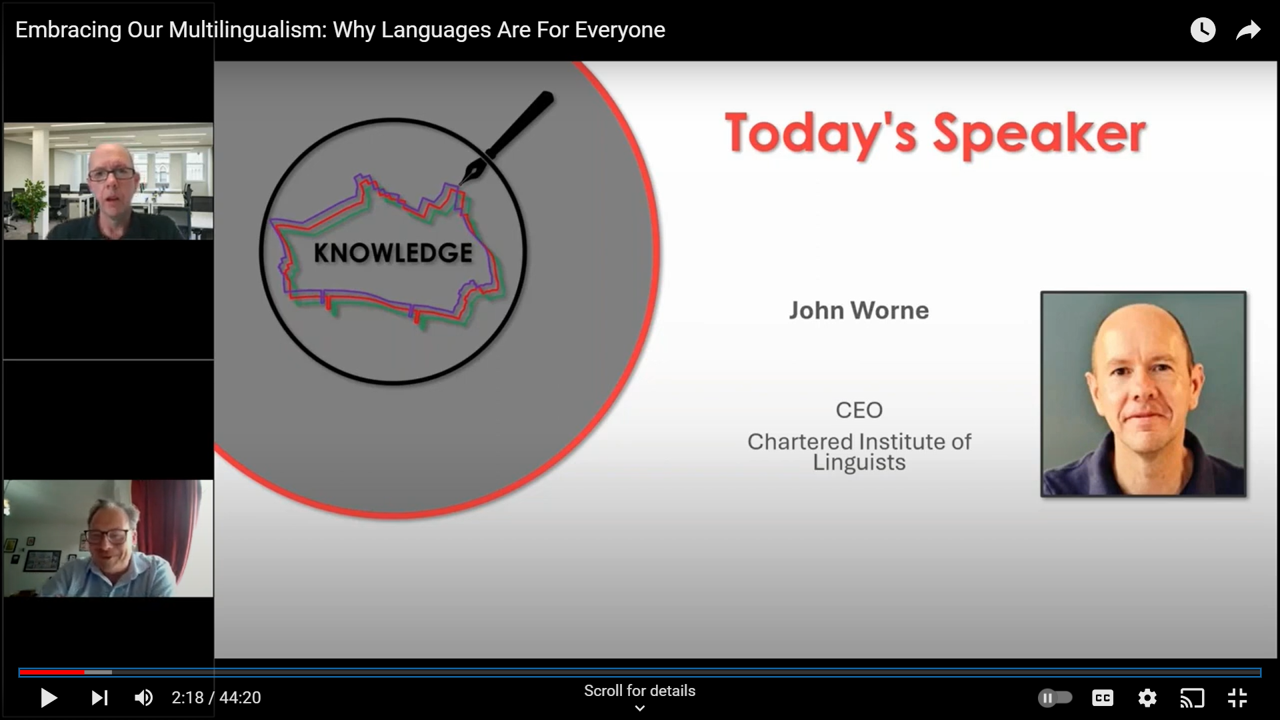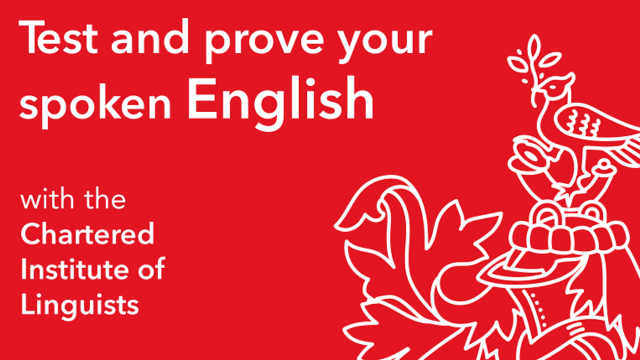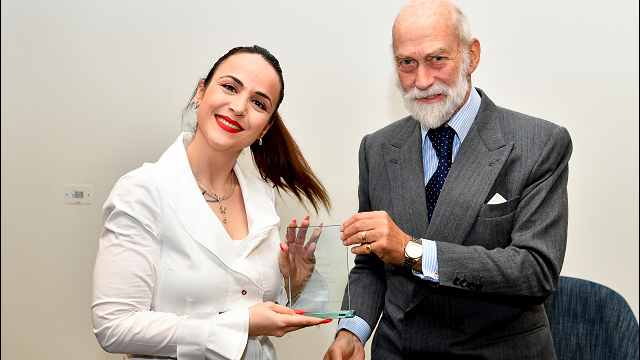-
QUALIFICATIONS
- For Linguists Worldwide
- For UK Public Services
- Preparation
- Policies & Regulation
-
MEMBERSHIP
- Join CIOL
- Membership grades
- NEW for Language Lovers
- Chartered Linguist
- Already a member?
- Professional conduct
- Business & Corporate Partners
-
ASSESSMENTS
- For Second Language Speakers
- English as a Second Language
-
TRAINING & EVENTS
- CIOL Conference Season 2025
- CPD, Webinars & Training
-
NEWS & VOICES
- News & Voices
- CIOL eNews
- CIOL Awards
- The Linguist
- Jobs & Ads
-
RESOURCES
- For Translators & Interpreters
- For Universities & Students
- Standards & Norms
- CIOL & AI
- All Party Parliamentary Group
- In the UK
- UK Public Services
- Find-a-Linguist
Languages are for Everyone: Embracing Our Multilingualism
In a recent Lord Mayor of London’s ‘Knowledge Miles’ lecture series webinar, Chartered Institute of Linguists Chief Executive John Worne presented on: “Why languages are for everyone” and the importance of embracing multilingualism. The lecture, part of the Lord Mayor's "Connect to Prosper" theme, addressed the connections in and around the City of London's ‘Square Mile’ and how these might help tackle future global challenges.
John began by highlighting the often-overlooked value of language skills, particularly in English-speaking countries. He emphasised that while learning languages to a high standard is not easy - requiring many hundreds of hours of practice - it is achievable for almost everyone, given sufficient exposure and effort. John pointed out that globally, there are more functionally bilingual people than monolingual individuals, challenging the notion that multilingualism is rare or exceptional.
His presentation addressed the "tyranny of fluency" - the belief in anglophone countries that unless one is fluent in a language, it's not worth using at all. This mindset, combined with the significant time investment required to learn a language, often leads to people with usable language skills not practicing or developing them further. John explained the Common European Framework of Reference for Languages (CEFR) to illustrate the various levels of language proficiency and the time typically required to achieve each level.
John stressed the value of language skills at all levels, not just fluency. He argued that even basic language skills can make a significant difference in personal and professional contexts. For those who have previously learned languages but let them lapse, he urged rekindling these skills - stressing that they represent a valuable investment of time that shouldn't be discarded and a future opportunity which shouldn't be missed.
The lecture highlighted the accessibility of language learning in today's digital age. John shared his own personal experiences with language learning apps like Duolingo and Memrise, which he uses daily to maintain and improve his language skills. He emphasised that these tools, along with university evening classes and other online resources make it easier than ever for people to invest time in language learning, regardless of their schedule or location.
Addressing the benefits of language skills, John discussed their potential for far-reaching impact, both for individuals and employers. In a globalised world, the ability to communicate across cultures and languages is always a valuable asset, opening up as it does new opportunities for personal and professional growth. As AI increasingly automates routine tasks, John also argued that 'deeply human' skills like intercultural competence and language proficiency will become even more valuable.
The presentation also touched on the CIOL's role in promoting language skills in the workplace. The Chartered Institute offers CEFR-based Language-Level Assessments in over 40 languages, providing people with a clear understanding of their current language-speaking abilities and enabling them to explain these skills effectively to employers. John encouraged employers to recognise and leverage the language skills within their workforces to enhance their international reach and competitiveness.
In the Q&A session following the lecture, John addressed several key topics:
AI in translation: While acknowledging AI's potential as a tool, John stressed the continued importance of human translators, particularly for high-stakes or nuanced translations.
Reading and writing skills: While emphasising speaking skills in the lecture, he stressed the value of all four language skills (reading, writing, speaking, and listening) for a comprehensive use and ability in a language.
The return on investment for language learning: John encouraged individuals to really consider the personal value and sense of achievement that comes with language skills, beyond career prospects albeit this is important too.
Trends in language learning: Noting the rise of Spanish in UK schools (overtaking French as the most studied language) John also highlighted the increasing recognition of the value and importance of home, heritage and community languages.
The value of studying ancient languages: John discussed how learning any language – including Latin or Ancient Greek - provides a deeper understanding of linguistics and language structures, aiding in the learning of all languages.
The future of English: Addressing the convergence and divergence of English dialects/variate globally (British, US, Australian, South African, South and South-East Asian etc.) John explained the competing forces of mutual intelligibility and hybridisation and tendency towards differentiation and signalling of distinctiveness of identity that shape the evolution of languages. English develops with and belongs to all the English speakers in the world, not to any one country or dialect.
In conclusion, John's lecture set out the case for the personal, professional, and societal benefits of embracing multilingualism. By challenging common misconceptions about language learning and highlighting the accessibility of modern language learning tools, he encouraged listeners to value their existing language skills and consider investing time in developing new ones.
As the world becomes increasingly interconnected, all levels of ability to communicate across languages and cultures are valuable; after all languages both define and describe the human experience.
To see the full lecture on YouTube click here or on the image below.
More
The Chartered Institute of Linguists (CIOL), Incorporated by Royal Charter, Registered in England and Wales Number RC 000808 and the IoL Educational Trust (IoLET), trading as CIOL Qualifications, Company limited by Guarantee, Registered in England and Wales Number 04297497 and Registered Charity Number 1090263.









